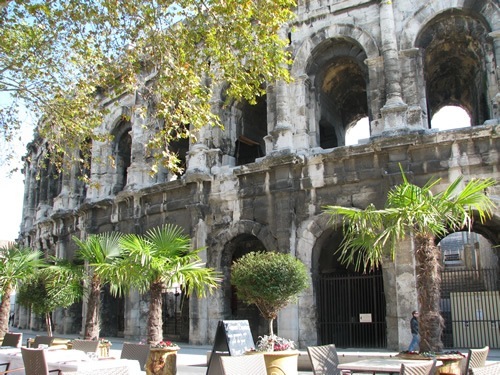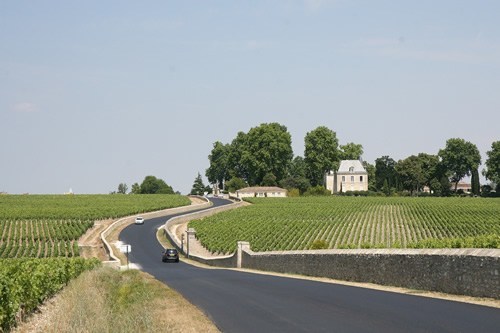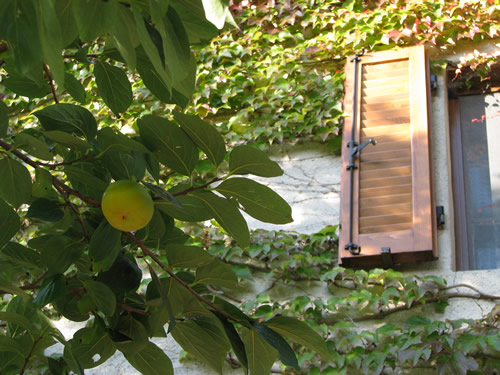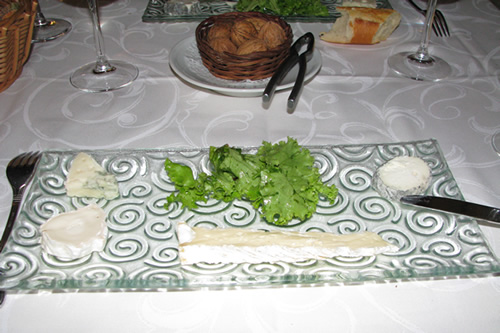How to Travel in France to Get the Most for the Euro
By Christina Rebuffet-Broadus
Resources updated 2/15/2024 by Transitions Abroad

|
|
Nimes, in the south of France, is another
spectacular destination during
the very pleasant off-season months of September and November.
Photo ©Transitions Abroad.
|
Recently, the dollar has rebounded
strongly relative to the Euro. The gyrations
of currencies never meant that you had to revert to a “staycation” or
put France on your list of retirement savings blowouts. With a
touch of inside knowledge and a splash of French phrases, you
can always enjoy more than a few French freebies.
Transportation Options in France
If the thought of putting yourself between a Frenchman and his after-work aperitif makes you want to throw one back yourself, take the train. The SNCF's extensive network zigzags to most corners of the Hexagon and leaves little reason to join the kamikazes on the autoroutes. Not only are the motorways expensive (except in Brittany, whose historical heritage includes free road networks), but French drivers notoriously tailgate, even at high speeds. If your itinerary does not involve straying too far into the vineyards, the train is your ticket to tranquility and offers the opportunity to catch up with your guidebook.
The SNCF is French bureaucracy at its red tape worst. Navigating the numerous price categories, various discounts, and reservation restrictions can cause headaches and unintelligible bouts of French swearing — but it can be done. The big one to remember is the Prem's tickets, which can go for as little as 20 Euros one way if you reserve in advance. Tickets go on sale three months before the departure date. The early bird catches the cheap ticket, so plan ahead if possible.
If day-to-day trips are more to your liking, a single country rail pass for France may be your ticket. With it you can speed between the hub cities and then purchase individual tickets to towns nearby. Of course, this is possible with the cheap tickets in France via the SNCF as well, but the country rail pass allows you to be spontaneous. Long-term reservations are not absolutely necessary; you will just need to check that a seat is available as soon as you know when and where you want to go. Another helpful reminder: Save your rail pass days for longer trips. If you are based in Bordeaux for a few days — but want to branch out to, say the grands crus of neighboring Saint Emilion — a round trip ticket purchased directly at the train station will only cut about 15 Euros out of your wine tasting budget. Sometimes buses also link cities for just a few Euros, so scan for information at the gare routière, the big bus hub usually found near the train station,
If your trip is centered on exploring offbeat chateaux,
vineyards, and villages, it makes sense to rent a car.

|
|
Driving through the great wine region
of Bordeaux allows you to go at your own pace.
|
If you are up for trying to chat in French, why not legally hitch a ride with someone? With “covoiturage” or carpooling programs, you just exchange a little gas money to get from Nantes to Nice, for example. Several websites exist, most in French, but some in English. There is no guarantee regarding the driver's language knowledge, but then you do not always need verbal language to communicate. You may even be amazed at how quickly your hand gesture and drawing skills improve before arriving at your destination.
Perhaps you are not ready for full-blown
French conversation. Why not rent a bike and ask directions to
the nearest Gothic cathedral? Several cities have started their
own rent-a-bike programs, which is great for time-saving sprints
from monument to monument. With a bank card deposit (that's refunded
when you drop off the bike), you can pedal away to city visit
bliss. You may be able to dodge French service workers with Paris
style Vélib, but only if you have a credit card with
a microchip. Some smaller cities rent bikes, but have not yet
installed a free service system. This means you can just pay cash
and pedal off for a few hours or even days. Again, this presents
a good chance to try out all that French that you have been practicing.
To be sure that a bike rental system exists, check with the city's
tourism office. They should know and probably even speak pretty
good English.
Lodging: Where to Sleep in France?
France is not the world's favorite vacation
destination for nothing — they know how to accommodate! For
a huge variety of lodgings, avoid the “Best Western” brands
of chains and opt for smaller and often family-owned auberges (bed and breakfasts).
These may or may not be affiliated with a national program like
Logis de France, but accredited or not these are some of the best
places for an all around experience of life à la française.
The food will likely overwhelm your taste buds before you head
off to your charming chambre. While cheaper than some
chain hotels, an auberge may still bottom out your budget
by about 100 Euros per night. The experience justifies the price,
but diehard budgeters may seek or have no choice but to find a
way to stay for free. Forget park benches or tents set up in the
middle of nowhere. Budget travel has come of age.

|
|
A comfortable auberge in Chenonceau
with gracious hosts, fine food, and near one of the most
unique castles in the Loire valley. Photo ©Transitions Abroad.
|
Freebooters can join the couchsurfing community
to sleep gratis while making a new friend who can fill you in
on all the inside local tips. Here is the concept: You go to www.couchsurfing.org and create a profile. This gives you access to forums and chat rooms which allow you to get to know fellow surfers. When the big trip finally approaches, you can search for available couches (sometimes even a real bed!) in your destination. Host and surfer agree on the dates you will stay. Once you arrive you have both a host(s) and a living guidebook right there waiting for you. Not only does the whole thing cost zero Euros, but it encourages travelers to meet locals, exchange ideas, and maybe even build lasting friendships. Just do not forget to do something nice for your host as a gesture of appreciation for their hospitality: Help out with household chores, share a special skill you may have, or even take him or her out to dinner.
Food: French Cuisine Need not be
Expensive
Speaking of dinner, what better place to eat than in France? While budget travelers do not have the luxury of feasting on the edible art created by great French chefs such as Bocuse or Ducasse, French culinary traditions present their own feast of unbelievably delicious, and often budget-friendly fare. France is dotted with open-air markets which guarantee fresh and usually local produce. Prices often beat those at chain supermarkets such as Carrefour or LeClerc. When locals shop at markets they take the time to smell, thump, and even taste what they are being offered. And you can too. France has a strong tradition of “try before you buy” — meaning you can start your meal even before you purchase it. Sample the slices of dry sausage and small squares of hard cheeses. Try a few of the olives placed before the big salty barrels. A stroll through one of these markets will whet your appetite with a sampling of France's best products. Then you can go back and pick up the fine ingredients for a simple and delicious meal.

|
|
A typical cheese plate
completes a meal at an auberge in France. Photo ©Transitions Abroad.
|
The very same ingredients often go into meals dished out by local brasseries and cafés. By stealing away from the main tourist arteries, good plats du jour can be found for as little as six or seven Euros. Of course, you may have to forgo the view of the Arc de Triomphe. But why not eat out cheaply and then linger over a Champs-Elysées coffee while soaking up inspiration for post cards to send back home? So how do you find out which places are reliably good? Simple — just dare to ask! Learn at least enough French to find out who speaks English and then ask for some tips. You may even be offered lots of other helpful secrets that many guidebooks do not mention.
Culture: Experience France on the Cheap, But in a Good Way
It may no longer be a secret that all national French museums go gratuit (free) the first Sunday of each month. What may be more of a secret is that some of the departmental museums (those financed by the local councils) never charge admission. Ever. That's right, these museums are free year round, sometimes even for temporary exhibits. An audio guide may empty a few Euros out of your pockets, but if the museum displays everything in French, the small fee pays itself back in cultural insight. Be careful, as not all departments can rack up the necessary funds to finance free entry. Again, your best bet is to ask at the tourism office.
France can easily break your budget, there is no question about that. But it does not have to. Thinking like a local can open lots of doors to lower costs. Traveling to another country is partly about experiencing it as the natives do. So leave the hotel breakfast at the hotel. How many people do you know who eat breakfast in their hometown hotels? It often pays to ask for information, so go ahead and ask. Ask at the tourist office. Ask your inn keeper or your host. Ask people in the streets. But do not expect them to speak your language and if you do not, at least approach them in theirs. Even mangled French beats no French at all. And remember, budget travel does not mean sparing all comforts — it means being in the know about where you leave your Euros.
Resources for Affordable Travel in France
Rail Information
SNCF provides information and a booking service for the both high-speed and other trains in France.
Eurail offers many possible rail schemes across countries in Europe.
Car Rentals
You can also try the sites of major car rental companies for discounts and promotions, and Autoeurope.com serves as a car rental search engine and reservation system that also offers long-term car rentals using cheaper leases starting at 21 days.
As for carpooling, BlaBlaCar lets you search for car seats available and usually for an affordable price.
Bicycles
All of these sites can be viewed in English. Check the sites for prices and rental procedures, as these vary from city to city.
Paris: Vélib' Métropole.
Lyon: vélo'v.
Lodging
You can reserve auberges and
other accredited lodging via the Logis
de France website.
Museums
For a list of free museums in Paris
check out the Paris Je t'Aime page.
|
Christina Rebuffet-Broadus is
a freelance journalist and English teacher living in Alpine,
France. In addition to Transitions Abroad, her
work has appeared in New Orleans Magazine, South Mississippi
Living. Specializing in French culture and cuisine, she definitely doesn't
regret moving from Mississippi to mountainous Grenoble.
|
